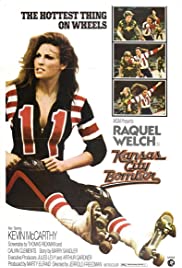
KANSAS CITY BOMBER
US, 1972, 99 minutes, Colour.
Raquel Welch, Kevin Mc Carthy.
Directed by Jerrold Freedman.
Kansas City Bomber is a routine sports film, focusing on women in the Roller Derby. It was a star vehicle for Raquel Welch in the early 1970s where she made quite a number of dramas and action films. Kevin Mc Carthy is very good as the owner of the team and Jodie Foster appears in a small supporting role. In later decades, Drew Barrymore directed Whip It, starring herself and Juliette Lewis, in a 21st century variation on Roller Derby sports and competitiveness.
1. An entertaining and interesting film? Hew attractive, repellent? For fans of the sport? For those against? For those interested in sport films? For what audience was it made?
2. The atmosphere of films about sport? Audience expectations and hopes: for scenes of the sport, personalities involved in it, crises in their way of life, the crises in managing the sport itself, crowds and their response, business background? How well were these presented? A conventional sports film, different?
3. Colour photography, the various songs and their lyrics, the music? The atmosphere of the Roller Derby? The importance of the credits sequence and the anthem and the guffawing? The immediate impact of the fight and the brutality? The background of Roller Derby and the way that this was filmed? Comment on other special effects, for example the climactic fights between K.C. and Jackie?
4. How interesting was the plot? How much the conventional story of heroine and her problems? Could audiences identity with K.C.?
5. Belief in the wheeler-dealing that goes on as background to sport? The fixing of matches? The building up of reputations? The hyper-tension on the personal life of the stars?
6. The film's focus on K.C. Raquel Welch and her contribution and style, the fact that she did her own stunt work herself? Audience sympathy for her, during the credits sequences, the brutality and the fighting with Big Berths? not ambitious, fun and fortune? Her hopes? Her reliance on Burt? Her emotional involvement with him? The repercussions for the matches and her losing them, moving to Portland, the effect on her children and mother? Her reaction to the confrontation with Jackie and her reputation? The repercussions on K.C's. character and her trying to deal with Jackie? Her response to the build-up of the match and her having to lose it to move to Chicago? What made her get through? The reasons for her decision to win against Jackie? The physical violence and the intensity of her final clash? The fight outside the Derby, inside the Derby? What future had she? A sympathetic and accurate portrayal of this kind of sports celebrity? How much insight into character and problems?
7. The other women in the Roller Derby: Big Bertha and her reputation, the public feud and the participation in it, the petty manoeuvres for public consumption? Jackie and her reputation, her clinging to it, her desperation, the throat of K.C? Their fight on the train-line? The desperation for both to win during the final fight? The humiliation for Jackie and her future? as K.C's room-mate and being used? The portrayal of the other girls and the effect of this sport on their way of life? Its violence, competition, physical exertion, demands, commercialism?
8. The portrayal of Burt? A credible man, a wheeler-dealer, how much personal interest in her, how much using her for his own ambitions? His staff and his relationship with them? Their challenging his decisions and yet his persisting? The affair with K.C. and his using people? His attitude towards her? His final relentless ruthlessness? A credible and authentic character?
9. The contrast with the presentation of K.C’s mother and her worries about family life, K.C. and the sequence with her children, the more lyrical tons, the change of atmosphere? K.C. as a credible mother? The conflict between family and sport? Her daughter and her ambitions, her son not speaking to her? The influence in her final decision concerning her family?
10. The portrayal of sport and audience reaction to this, competitiveness, commercialism, blood lust, fanaticism, fan clubs, people's lives being moulded to their fans’ expectations? The cruelty and fickleness of the crowd? The value of this kind of professional sport? The film's critique?
11. How valuable in this kind or film for those who enjoy the sport, for those who do not? Is it a satisfactory critique or merely a commercial presentation of the issue?